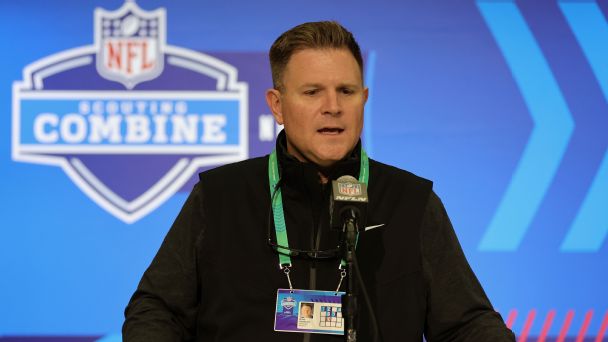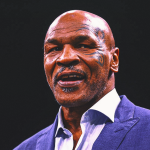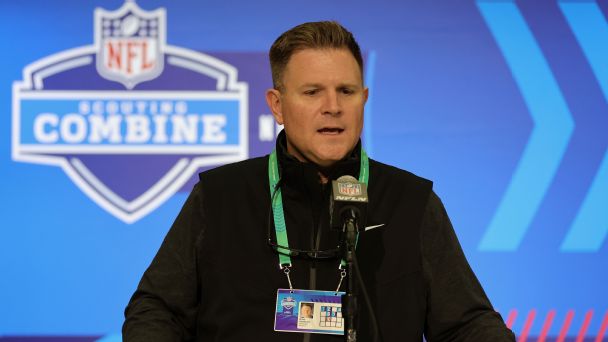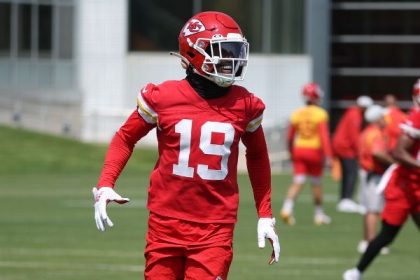
GREEN BAY, Wis. — Eliot Wolf was a 9-year-old hanging around the Lambeau Field scouting offices in 1992 when his father, Ron, the Green Bay Packers‘ general manager at the time, traded for Brett Favre. He was a pro personnel assistant with the Packers when they drafted Aaron Rodgers in 2005. He had left the Packers by the time they traded up to pick Jordan Love in 2020 but had worked with just about everyone still left in their scouting department.
If anyone can speak to why the Packers keep finding quarterbacks, it might be Wolf.
“Luck,” he deadpanned when asked that question last week at the NFL scouting combine.
“No, just kidding,” said Wolf, who is director of scouting for the New England Patriots. “I think the scouting process that I grew up with — that [Packers general manager] Brian Gutekunst continues to employ — has been really good. They’ve been fortunate enough to sit Rodgers and sit Love for [three seasons each] and that’s been able to help them. I wouldn’t say that that applies to every quarterback, but it certainly helps them.”
By the time Love’s first season as a starter ended with a run to the 2023 NFC divisional round, praise had been heaped on coach Matt LaFleur, who catered the offense and his playcalling to Love; on quarterbacks coach Tom Clements, a master of the fundamentals; and on Love, of course, for leading the Packers into the playoffs.
But what about Gutekunst?
“Steady. He’s just been steady,” said Seattle Seahawks general manager John Schneider, a former Packers personnel executive, last week at the combine. “Always has been.”
In fact, no one in the scouting business has known Gutekunst longer than Schneider, who was with the Kansas City Chiefs when they gave Gutekunst his first full-time scouting assignment in 1998.
“He did an internship in Green Bay, and then we hired him in Kansas City,” Schneider said. “[He] never wavers, works his tail off, really even-keeled. In my opinion, he’s a very forward communicator. We can have conversations on the phone and get caught up in about 10 minutes, which I like. Obviously, this year, the way the quarterback, Love, played for them, I was really happy for him. It’s not easy, and I’m really happy for him.”
But it’s not just the quarterback.
Gutekunst’s past two draft classes formed the foundation for what the Packers were this past season: the youngest team to win an NFL playoff game since the 1970 AFL-NFL merger. They were the youngest team to make the playoffs since the 1974 Buffalo Bills, according to the Elias Sports Bureau.
Ten of the 11 draft picks from the 2022 class remain on the Packers’ roster. Only seventh-round safety Tariq Carpenter is no longer with the team. Six of those players — LB Quay Walker (first round), DE Devonte Wyatt (first), WR Christian Watson (second), WR Romeo Doubs (fourth), OT Zach Tom (fourth) and OT Rasheed Walker (seventh) — were regular starters. Guard Sean Rhyan (third) will likely become a starter next season.
Ten of the 13 draft picks from 2023 played significant roles as rookies — with receivers Jayden Reed and Dontayvion Wicks and tight ends Luke Musgrave and Tucker Kraft earning substantial roles on offense.
Gutekunst didn’t add any high-priced free agents last offseason. Part of that was due to the salary limitations of Rodgers’ dead money. Part of it was by design to build a team, especially on offense, that could grow and develop with Love.
“I don’t think that we did something magical … all of a sudden,” Gutekunst said last week at the combine. “I think a lot of it is the opportunity that they were given, and I think that’s really important. It’s tough as a young player in this league to earn your opportunities and capitalize on them and let that grow. Our team, what we were doing with our football team, allowed for a lot of that opportunity. And, again, it’s a credit to those guys for seizing that opportunity and doing what they did.”
With the increased 2024 salary cap, Gutekunst might be more likely to dip into free agency this offseason, but with five picks in the first three rounds, he has a chance to put together another impactful draft class.
While Gutekunst inherited Rodgers, he didn’t simply ride the MVP until he was out of gas. He had the foresight — as unpopular as it may have been at the time — to follow longtime Packers GM Ted Thompson’s plan to pick a quarterback before he needed one, like Thompson did with Rodgers in 2005, when Favre was coming off another 4,000-yard, 30-touchdown campaign.
“You have to invest the time in these players to find out who they are and if they’re going to be the best ones for your organization,” said Jacksonville Jaguars coach Doug Pederson, a former backup quarterback with the Packers during the Favre era.
“In Green Bay, they actually traded for Brett. Who knows what would’ve happened if he stayed in Atlanta at the time. Ron Wolf saw something with Brett. Aaron Rodgers came in on the heels of that, and now Jordan Love. We can all take a piece out of their puzzles so to speak in evaluating quarterbacks.”
Packers president Mark Murphy signed Gutekunst to a contract extension in 2022, shortly before his fifth season as GM. It’s possible Murphy could sign him to another extension before Murphy reaches the mandatory retirement age of 70 (July 2025) for Packers presidents.
“What I love about Brian is he doesn’t have an ego,” Murphy said before last season. “It’s what is going to be best for the organization. He took a lot of heat when he drafted Jordan Love, but at least in my mind, that pick has turned out to be. … We’ll see what Jordan ends up being. Hopefully, he’ll be very solid and a good quarterback, but selecting [Love] gave us the flexibility to now be able to trade Aaron [to the Jets] and were able to get a pretty good return for him.”











